Yufei Ma
CSMCIR: CoT-Enhanced Symmetric Alignment with Memory Bank for Composed Image Retrieval
Jan 07, 2026Abstract:Composed Image Retrieval (CIR) enables users to search for target images using both a reference image and manipulation text, offering substantial advantages over single-modality retrieval systems. However, existing CIR methods suffer from representation space fragmentation: queries and targets comprise heterogeneous modalities and are processed by distinct encoders, forcing models to bridge misaligned representation spaces only through post-hoc alignment, which fundamentally limits retrieval performance. This architectural asymmetry manifests as three distinct, well-separated clusters in the feature space, directly demonstrating how heterogeneous modalities create fundamentally misaligned representation spaces from initialization. In this work, we propose CSMCIR, a unified representation framework that achieves efficient query-target alignment through three synergistic components. First, we introduce a Multi-level Chain-of-Thought (MCoT) prompting strategy that guides Multimodal Large Language Models to generate discriminative, semantically compatible captions for target images, establishing modal symmetry. Building upon this, we design a symmetric dual-tower architecture where both query and target sides utilize the identical shared-parameter Q-Former for cross-modal encoding, ensuring consistent feature representations and further reducing the alignment gap. Finally, this architectural symmetry enables an entropy-based, temporally dynamic Memory Bank strategy that provides high-quality negative samples while maintaining consistency with the evolving model state. Extensive experiments on four benchmark datasets demonstrate that our CSMCIR achieves state-of-the-art performance with superior training efficiency. Comprehensive ablation studies further validate the effectiveness of each proposed component.
InfoGain-RAG: Boosting Retrieval-Augmented Generation via Document Information Gain-based Reranking and Filtering
Sep 16, 2025



Abstract:Retrieval-Augmented Generation (RAG) has emerged as a promising approach to address key limitations of Large Language Models (LLMs), such as hallucination, outdated knowledge, and lacking reference. However, current RAG frameworks often struggle with identifying whether retrieved documents meaningfully contribute to answer generation. This shortcoming makes it difficult to filter out irrelevant or even misleading content, which notably impacts the final performance. In this paper, we propose Document Information Gain (DIG), a novel metric designed to quantify the contribution of retrieved documents to correct answer generation. DIG measures a document's value by computing the difference of LLM's generation confidence with and without the document augmented. Further, we introduce InfoGain-RAG, a framework that leverages DIG scores to train a specialized reranker, which prioritizes each retrieved document from exact distinguishing and accurate sorting perspectives. This approach can effectively filter out irrelevant documents and select the most valuable ones for better answer generation. Extensive experiments across various models and benchmarks demonstrate that InfoGain-RAG can significantly outperform existing approaches, on both single and multiple retrievers paradigm. Specifically on NaturalQA, it achieves the improvements of 17.9%, 4.5%, 12.5% in exact match accuracy against naive RAG, self-reflective RAG and modern ranking-based RAG respectively, and even an average of 15.3% increment on advanced proprietary model GPT-4o across all datasets. These results demonstrate the feasibility of InfoGain-RAG as it can offer a reliable solution for RAG in multiple applications.
MoDULA: Mixture of Domain-Specific and Universal LoRA for Multi-Task Learning
Dec 10, 2024



Abstract:The growing demand for larger-scale models in the development of \textbf{L}arge \textbf{L}anguage \textbf{M}odels (LLMs) poses challenges for efficient training within limited computational resources. Traditional fine-tuning methods often exhibit instability in multi-task learning and rely heavily on extensive training resources. Here, we propose MoDULA (\textbf{M}ixture \textbf{o}f \textbf{D}omain-Specific and \textbf{U}niversal \textbf{L}oR\textbf{A}), a novel \textbf{P}arameter \textbf{E}fficient \textbf{F}ine-\textbf{T}uning (PEFT) \textbf{M}ixture-\textbf{o}f-\textbf{E}xpert (MoE) paradigm for improved fine-tuning and parameter efficiency in multi-task learning. The paradigm effectively improves the multi-task capability of the model by training universal experts, domain-specific experts, and routers separately. MoDULA-Res is a new method within the MoDULA paradigm, which maintains the model's general capability by connecting universal and task-specific experts through residual connections. The experimental results demonstrate that the overall performance of the MoDULA-Flan and MoDULA-Res methods surpasses that of existing fine-tuning methods on various LLMs. Notably, MoDULA-Res achieves more significant performance improvements in multiple tasks while reducing training costs by over 80\% without losing general capability. Moreover, MoDULA displays flexible pluggability, allowing for the efficient addition of new tasks without retraining existing experts from scratch. This progressive training paradigm circumvents data balancing issues, enhancing training efficiency and model stability. Overall, MoDULA provides a scalable, cost-effective solution for fine-tuning LLMs with enhanced parameter efficiency and generalization capability.
Automatic Compiler Based FPGA Accelerator for CNN Training
Aug 15, 2019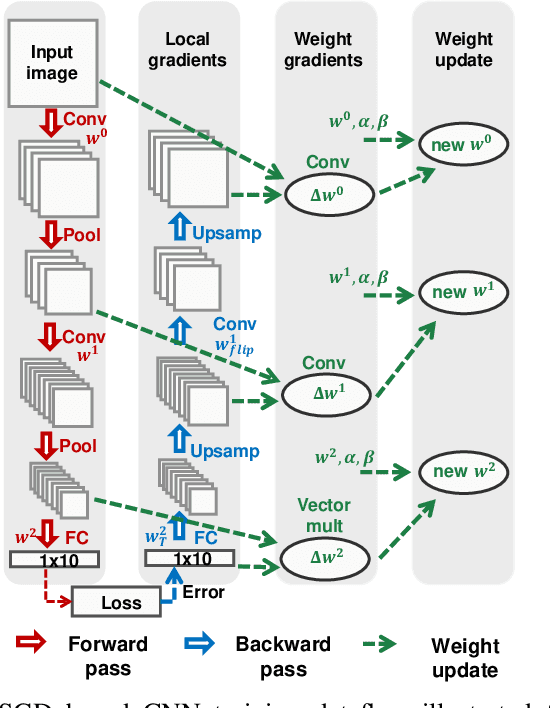
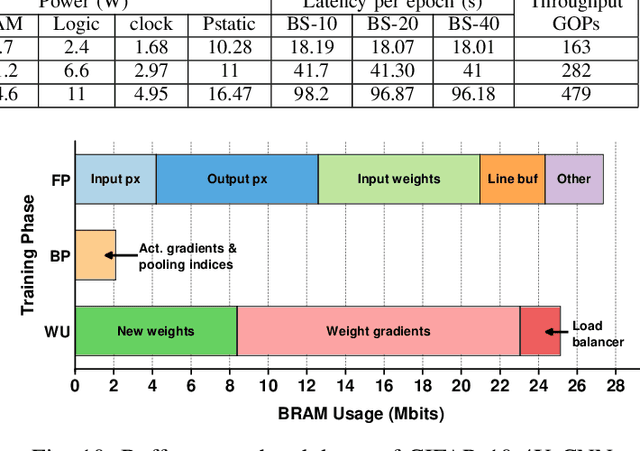
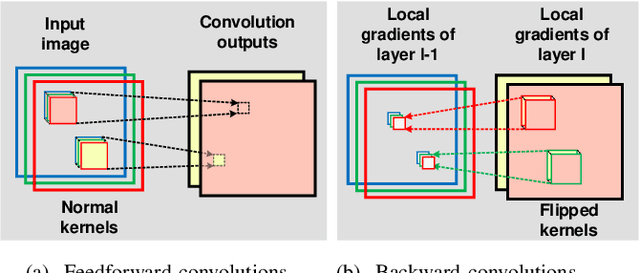
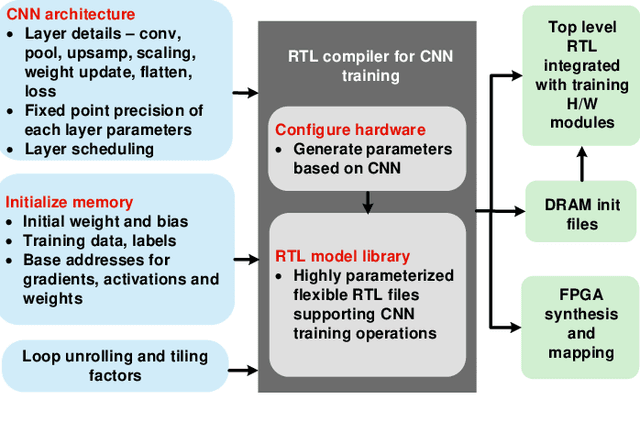
Abstract:Training of convolutional neural networks (CNNs)on embedded platforms to support on-device learning is earning vital importance in recent days. Designing flexible training hard-ware is much more challenging than inference hardware, due to design complexity and large computation/memory requirement. In this work, we present an automatic compiler-based FPGA accelerator with 16-bit fixed-point precision for complete CNNtraining, including Forward Pass (FP), Backward Pass (BP) and Weight Update (WU). We implemented an optimized RTL library to perform training-specific tasks and developed an RTL compiler to automatically generate FPGA-synthesizable RTL based on user-defined constraints. We present a new cyclic weight storage/access scheme for on-chip BRAM and off-chip DRAMto efficiently implement non-transpose and transpose operations during FP and BP phases, respectively. Representative CNNs for CIFAR-10 dataset are implemented and trained on Intel Stratix 10-GX FPGA using proposed hardware architecture, demonstrating up to 479 GOPS performance.
Efficient Network Construction through Structural Plasticity
May 27, 2019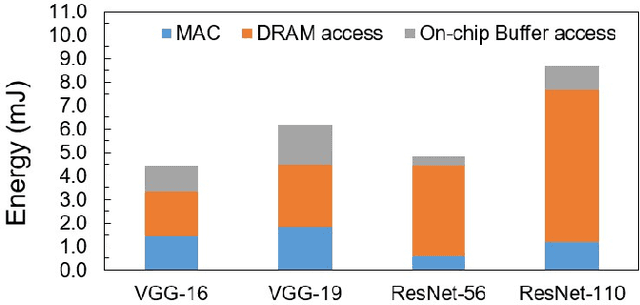
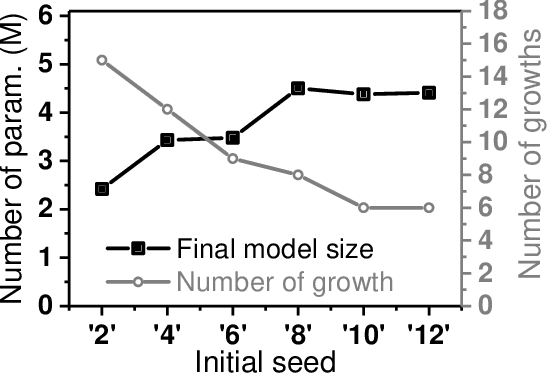

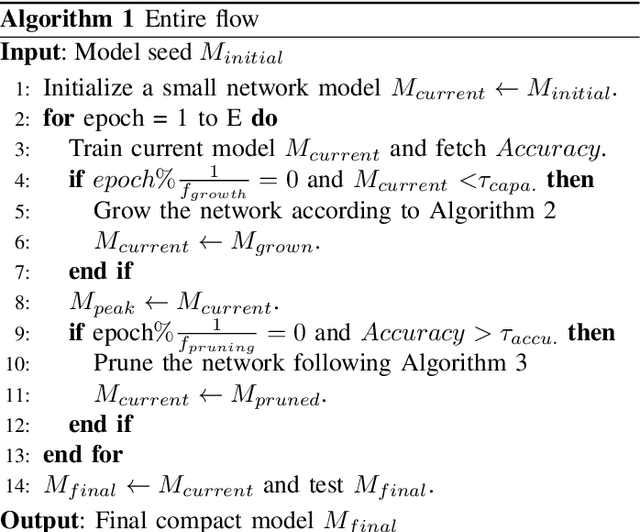
Abstract:Deep Neural Networks (DNNs) on hardware is facing excessive computation cost due to the massive number of parameters. A typical training pipeline to mitigate over-parameterization is to pre-define a DNN structure first with redundant learning units (filters and neurons) under the goal of high accuracy, then to prune redundant learning units after training with the purpose of efficient inference. We argue that it is sub-optimal to introduce redundancy into training for the purpose of reducing redundancy later in inference. Moreover, the fixed network structure further results in poor adaption to dynamic tasks, such as lifelong learning. In contrast, structural plasticity plays an indispensable role in mammalian brains to achieve compact and accurate learning. Throughout the lifetime, active connections are continuously created while those no longer important are degenerated. Inspired by such observation, we propose a training scheme, namely Continuous Growth and Pruning (CGaP), where we start the training from a small network seed, then literally execute continuous growth by adding important learning units and finally prune secondary ones for efficient inference. The inference model generated from CGaP is sparse in the structure, largely decreasing the inference power and latency when deployed on hardware platforms. With popular DNN structures on representative datasets, the efficacy of CGaP is benchmarked by both algorithm simulation and architectural modeling on Field-programmable Gate Arrays (FPGA). For example, CGaP decreases the FLOPs, model size, DRAM access energy and inference latency by 63.3%, 64.0%, 11.8% and 40.2%, respectively, for ResNet-110 on CIFAR-10.
 Add to Chrome
Add to Chrome Add to Firefox
Add to Firefox Add to Edge
Add to Edge